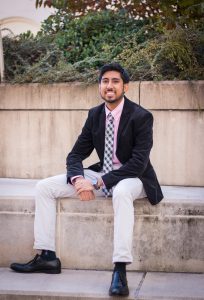
In February, the Class of 2021’s Shivam Gulhar will present findings from his stroke patient research at Johns Hopkins Hospital at the Association of Academic Physiatrists annual conference in Puerto Rico.
In high school, the Class of 2021’s Shivam Gulhar dreamed of becoming a computer engineer and changing the world through technology. But plans shifted his junior year when a misdiagnosed cornea ulcer left him blind for two weeks.
Suddenly, Gulhar found another calling, inspired by the care of an ophthalmologist he met at Johns Hopkins Hospital.
“He was my first exposure to how a doctor could really help a patient,” Gulhar says. “I was extremely upset — if my scar had been a centimeter down, I would have needed a transplant — but he quickly put me at ease. The care he provided saved me from permanent blindness and made me realize the importance of medicine.”
The Maryland native went on to shadow his ophthalmologist several times before coming to Virginia Commonwealth University as an undergraduate biology major with aspirations for a medical career. In 2017, he was accepted to the VCU School of Medicine.
His decision to study on the MCV Campus was reinforced when he learned he’d been awarded the Sarah Snyder Laughon Medical Scholarship.
The scholarship had been established upon Laughon’s passing, when she bequeathed a generous gift to the School of Medicine for scholarship support to deserving medical students. Her daughter, S. Katherine Laughon Grantz, is a 2000 graduate of the School of Medicine.
“While I worked hard to realize my dreams, I did not entirely understand the price that it would cost me,” Gulhar says. “Now that I have begun medical school, the financial burden is astonishing. But just as I was shown how medicine is the path for me earlier on in my life, I felt that earning a scholarship was nothing short of a sign that I truly deserved to be here and that medicine was my calling.”
Last summer, Gulhar returned to Johns Hopkins for a research rotation in the hospital’s Motion Analysis Lab at the Kennedy Krieger Institute. Through the Rehabilitation Research Experience for Medical Students, provided by the Association of Academic Physiatrists, he researched gait patterns of stroke patients and healthy adults with the ultimate goal of finding the best way to teach stroke patients how to improve their walking.
While on a treadmill, patients walked wearing oxygen masks and electrodes attached to nine different leg muscles, sending data to a computer to create a patient model. “Then we can develop a model that mimics stroke patients, giving physical therapists tools to target the most affected muscles during therapy and providing patients with the best treatment possible,” Gulhar says.
In February, he will present the lab’s findings at the Association of Academic Physiatrists annual conference in Puerto Rico.
“With the increasingly competitive nature of the residency match, being able to present his research at a national conference will distinguish Shivam from other applicants regardless of his eventual specialty choice,” says Christopher Woleben, M’97, H’01, associate dean for student affairs.
The School of Medicine’s 1838 Campaign aims to increase the number and size of scholarships to students. Full- and half-tuition scholarships are most urgently needed and serve as one of the medical school’s best resources for recruiting and rewarding top students. Learn more about how you can help a medical student escape debt.
Originally drawn to ophthalmology, Gulhar says the summer research experience — suggested to him by his sister, a medical student at Howard University who had worked with stroke patients — opened his eyes to other specialties where patient interaction plays a prominent role.
Luckily, thanks to the Sarah Snyder Laughon Scholarship that pays a portion of his tuition and fees, he has the freedom to let his interests (and not his student loans) decide his ultimate path in medicine.
“Debt can cause students to choose fields for monetary reasons,” Gulhar says. “I’m glad I don’t have that constraint. This scholarship allows me to choose what I want to do.”
By Polly Roberts